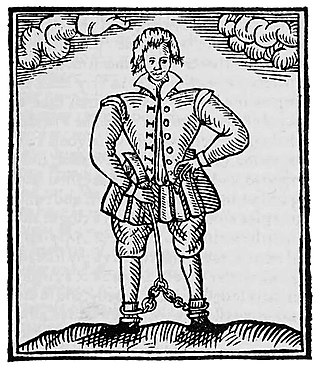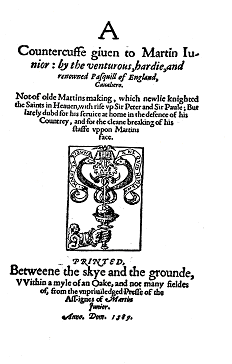Related Research Articles
This article presents lists of literary events and publications in the 16th century.
This article contains information about the literary events and publications of 1594.
This article presents lists of the literary events and publications in 1593.
This article contains information about the literary events and publications of 1592.
This article presents lists of the literary events and publications in 1590.
This article presents lists of the literary events and publications in 1588.
This article presents lists of the literary events and publications in 1578.

Thomas Nashe was an Elizabethan playwright, poet, satirist and a significant pamphleteer. He is known for his novel The Unfortunate Traveller, his pamphlets including Pierce Penniless, and his numerous defences of the Church of England.

Martin Marprelate was the name used by the anonymous author or authors of the seven Marprelate tracts that circulated illegally in England in the years 1588 and 1589. Their principal focus was an attack on the episcopacy of the Anglican Church.
Henry Chettle was an English dramatist and miscellaneous writer of the Elizabethan era, best known for his pamphleteering.

The Marprelate Controversy was a war of pamphlets waged in England and Wales in 1588 and 1589, between a puritan writer who employed the pseudonym Martin Marprelate, and defenders of the Church of England which remained an established church.

Jane Anger was an English author of the sixteenth century and the first woman to publish a full-length defence of her sex in English. The title of her defense, Jane Anger Her Protection For Women was published in 1589. In the late sixteenth century, it was rare for women to write and publish on secular, or non-religious themes. It was also rare for women to argue against male supremacy.
Queen Elizabeth's Men was a playing company or troupe of actors in English Renaissance theatre. Formed in 1583 at the express command of Queen Elizabeth, it was the dominant acting company for the rest of the 1580s, as the Admiral's Men and the Lord Chamberlain's Men would be in the decade that followed.
A gentlewoman in the original and strict sense is a woman of good family, analogous to the Latin generosus and generosa. The closely related English word "gentry" derives from the Old French genterise, gentelise, with much of the meaning of the French noblesse and the German Adel, but without the strict technical requirements of those traditions, such as quarters of nobility.
Events from the 1580s in England.
Events from the 1590s in England.
Job Throckmorton (Throkmorton) (1545–1601) was a Puritan English religious pamphleteer and Member of Parliament during the reign of Queen Elizabeth I. Possibly with John Penry and John Udall, he authored the Martin Marprelate anonymous anti-clerical satires; scholarly consensus now makes him the main author.

John Hales was the owner of the Whitefriars in Coventry at which two of the Marprelate tracts were printed on a secret press. He was the nephew and heir of John Hales, Clerk of the Hanaper, and the nephew of Sir Thomas Lucy of Charlecote.
George Carleton was a lawyer, landowner and Member of Parliament with strong Puritan sympathies. It has been suggested that he was the secret author of the Marprelate tracts, and both he and his third wife were prosecuted for their involvement in the Marprelate controversy. Ordered to appear daily before the Privy Council in April 1589, he died in early 1590 before a decision in the proceedings against him had been reached.
Elizabeth Hussey, later Elizabeth Crane and Elizabeth Carleton, was a religious activist with strong Puritan sympathies. She and her second husband, George Carleton, were prosecuted for involvement in the Marprelate controversy. The first of the anonymous Marprelate tracts, Martin's Epistle, was printed at her home in East Molesey, Surrey, in October 1588.
References
- ↑ Jane Anger her protection for women, to defend them against the scandalous reportes of a late surfeiting lover, and all other like venerians that complaine so to bee overcloyed with women's kindnesse
- ↑ Wilkinson, Endymion (2012). Chinese History: A New Manua l. Harvard-Yenching Institute Monograph Series. Cambridge, MA: Harvard University Asia Center. p. 413. ISBN 9780674067158.